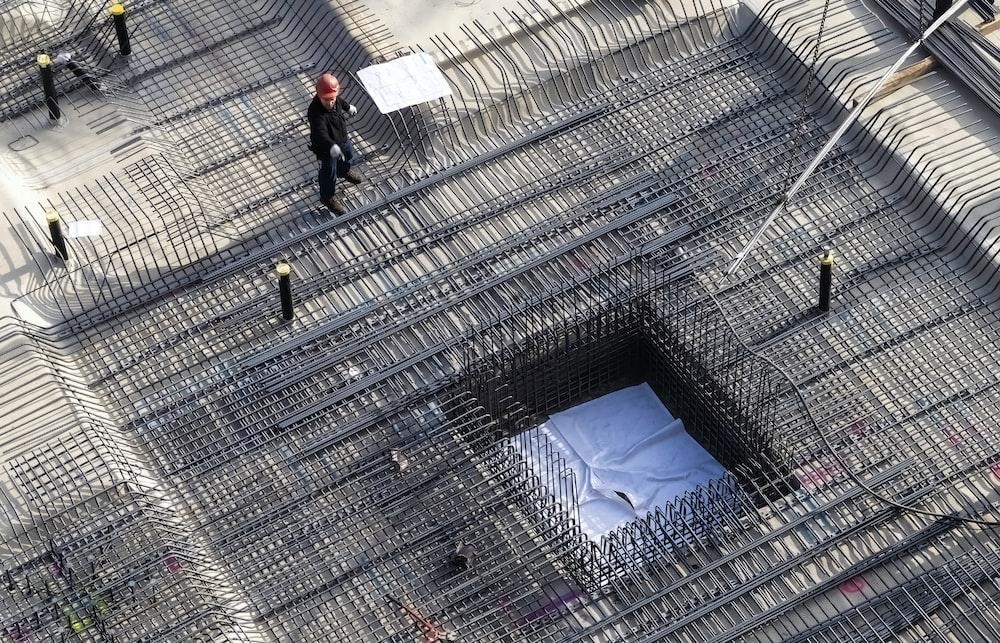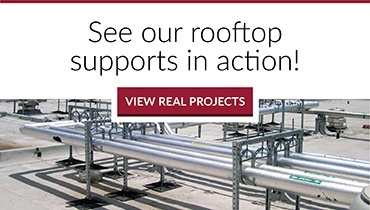In the world of roofing systems, the proper design and installation of pipe supports or pipe hangers are of paramount importance. These supports serve as vital components for the pipes and the entire roofing system. These systems aren’t just for code compliance. Their significance also extends to fostering employee and customer confidence.
When installed properly, Pipe hangers can help keep the pipes in their design place. This is true even during strong winds or seismic activity. Duct supports, walkways, and platforms can be combined to reduce the overall stress on your pipes, hence improving their longevity and performance.
In this article, we will take a closer look at the intricate world of pipe support design and its profound impact on roofing systems. We will explore the factors influencing proper support design, including load calculations, material selection, and compliance with industry standards.
What Are Pipe Supports?
Pipe supports are structural components designed to provide stability, load-bearing capacity, and proper alignment for pipes in roofing systems. Their goal is to prevent excessive pipe movement. This, in turn, minimizes vibrations and distributes the weight of pipes and associated equipment evenly.
Inadequate pipe supports can lead to excessive stress, deformation, and premature failure of the roofing system. Proper design ensures the prevention of structural damage, leaks, and costly repairs. Furthermore, it ensures compliance with building codes, regulations, and industry standards, improving safety and durability.
Properly designed supports also minimize the need for repairs and replacements, enhancing the lifespan of the roofing system. Normally, pipes may be installed in the roof by drilling and screwing holes within. However, this process may damage your roof’s integrity – let alone the pipes’ health.
In case of seismic activity or strong winds, the pipe hangers, duct supports, cable tray supports, or platforms must be installed in such a way that they reduce stress on the pipes as much as possible. This is possible by transferring the kinetic energy from pipes to the support structure.
The “zero penetration method” and supports that can flex to a certain degree play a critical role here. The reduced vibrations also mean a reduced risk of harmonic frequency being achieved. This, in turn, leads to a reduced risk of damage.
Technical Considerations in Pipe Support Design
There are two primary considerations to make when it comes to proper pipe support design in roofing;
- Load Calculation and analysis
- Material Selection.
Let’s take a closer look at these two to see how they can improve integrity, longevity, and performance.
Load Calculation & Analysis
When designing pipe support systems, accurate load calculation and analysis are essential for ensuring proper support functionality. Various types of loads imposed by pipes and associated equipment must be taken into account:
- Dead Loads: These refer to the weight of the pipes themselves, along with any fixtures or equipment attached to them. It is crucial to consider the weight distribution and magnitude of dead loads to determine appropriate support requirements.
- Live Loads: Live loads encompass dynamic forces exerted on the pipes during operation, such as fluid flow or mechanical vibrations. Understanding the magnitude and frequency of these loads is crucial for selecting robust support systems capable of withstanding them.
- Wind Loads: Wind can exert significant forces on pipes and their supports, especially in exposed rooftop environments. Analyzing wind patterns, and local climate data and considering the shape and orientation of the pipes are vital for designing support structures capable of resisting wind-induced loads.
- Seismic Loads: In regions prone to seismic activity, it is imperative to account for the potential impact of earthquakes on pipe support systems. Calculating seismic loads based on local building codes and seismic design criteria helps ensure adequate structural resilience.
- Thermal Expansion: Pipes are subject to thermal expansion and contraction due to temperature variations. The support design must allow for thermal movement without imposing undue stress on the pipes or the roof structure. Thermal expansion coefficients and anticipated temperature differentials guide the determination of expansion allowances and proper support design.
Accurate engineering calculations, simulations, and structural analysis tools aid in assessing load distribution and support requirements. By incorporating these technical considerations, PHP Systems helps mitigate excessive stress, deformations, and potential failures.
Material Selection & Durability
Choosing suitable materials for pipe support components is vital for ensuring long-term durability and performance. Several factors influence material selection:
- Mechanical Properties: Pipe support materials must possess adequate strength, stiffness, and load-bearing capacity to withstand the imposed loads. Analyzing the material's mechanical properties helps ensure that supports can effectively resist stress and deformation.
- Corrosion Resistance: Considering the environmental conditions surrounding the rooftop, including exposure to moisture, chemicals, or corrosive agents, is crucial for selecting materials with appropriate corrosion resistance. Preventing corrosion prolongs the lifespan and integrity of the support system.
PHP Systems' products excel in material selection and durability. Our support components are designed to withstand harsh environmental conditions, temperature variations, and exposure to chemicals. We only use high-quality materials with proven corrosion resistance. This ensures the long-lasting performance and reliability of our support systems, even in challenging rooftop environments.
PHP Systems: Innovations in Pipe Support Design
PHP Systems is renowned for its comprehensive range of rooftop support products. Our solutions include:
- Pipe supports,
- Duct supports,
- Cable tray supports,
- Equipment supports,
- Walkways,
- Crossovers,
- Stairs,
- Ramps, and
- Platform systems.
Our products are engineered and designed to work in synergy, creating sustainable and long-lasting support systems. The flagship innovation, our zero-penetration rooftop support system, eliminates the need to damage your roof’s integrity. This also preserves the roof's warranty and strength.
The system employs non-penetrating supports that distribute loads over a larger area, minimizing stress concentrations. We customize each supported product to suit specific building environments. This leads to improved standard compliance and performance.
PHP Systems' engineered solutions ensure that pipe supports are robust, reducing the risk of deformation and failure. We also help you minimize the need for repairs and replacements, enhancing the lifespan of the roofing system and pipes.
Each of our products comes with a 5-year warranty and provides replacements, no questions asked!
Final Words
The importance of proper design of pipe supports in roofing systems cannot be overstated. With PHP Systems, you can ensure the structural integrity and longevity of your roof and pipes. Our solutions provide enhanced safety, reduced maintenance costs, and long-lasting support.
If you’d like to learn more about our solutions and service or have any other questions, feel free to contact us today! We can help you establish a robust pipe support design on your roof within your budget!



